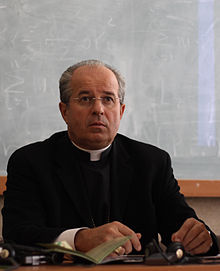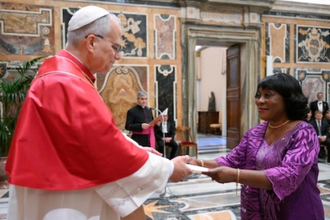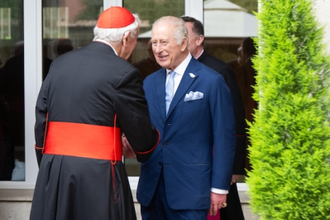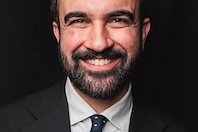Geneva: Holy See calls for international solidarity to solve global challenges

Archbishop Ivan Jurkovič
Source: VIS/Vatican Radio
The Holy See has appealed to the international community to face global challenges with solidarity and cooperation between nations. Archbishop Ivan Jurkovič, Permanent Observer of the Holy See to the UN in Geneva, made the appeal at the 35th Session of the Human Rights Council.
“For the wellbeing of our human family and the promotion and protection of the common good there is an urgent need to recognise the role of international solidarity as an essential element for the enjoyment of fundamental human rights by all,” he said.
He said international solidarity would help nations face current challenges “such as migration, climate change and natural disasters, armed conflicts and the growing gap between poor and rich.”
Archbishop Jurkovič said: “Solidarity does not oppose sovereignty; instead, it pushes for a deeper understanding of the concept of sovereignty as an expression of the freedom of people.”
Rather than trampling on a person’s rights, he said solidarity includes the recognition of the principle of subsidiarity.
“The two principles are mutually linked. Indeed, subsidiarity means assistance to the human person via the autonomy of intermediate bodies.”
Please find below the full text of the address:
Geneva, 6 June 2017
Mr President,
First of all, the Delegation of the Holy See expresses its appreciation to the Independent Expert at the end of her mandate for the work she accomplished throughout the last six years. For the wellbeing of our human family and the promotion and protection of the common good there is an urgent need to recognise the role of international solidarity as an essential element for the enjoyment of fundamental human rights by all.
International cooperation represents one of the most valuable ways to realize international solidarity “by virtue of which every human person and all peoples are entitled to equally enjoy the benefit from a harmonious international society with just and fair international, political and economic order.” [1]
The International Community is currently facing many challenges such as migration, climate change and natural disasters, armed conflicts and the growing gap between poor and rich. Looking at those issues, the Delegation of the Holy See is convinced that international solidarity represents an effective approach to answer them. Moreover, it is necessary that men and women of our day cultivate a greater awareness that they are debtors of the society of which they are a part.
“They are debtors because of those conditions that make human existence livable, and because of the indivisible and indispensable legacy constituted by culture, scientific and technical knowledge, material and immaterial goods and by all that the human condition has produced.” [2] Solidarity is not merely social work, but it should, as Pope Francis stated, “become the default attitude in political, economic and scientific choices, as well as in the relationships among individuals, peoples and countries.(…) Only by educating people to a true solidary will we be able to overcome the “culture of waste.” [3]
Mr President,
Solidarity does not oppose sovereignty; instead, it pushes for a deeper understanding of the concept of sovereignty as an expression of the freedom of people. It is not only a duty but a moral value which stems from the principle of human fraternity. Solidarity is unconditional care of the other and it requires the engagement of individual, private, national and international actors in order to ensure the full realization of human dignity and the common good. Thus, we call upon the necessity to implement and strengthen the principle of the responsibility to protect, especially towards the most vulnerable ones.
International solidarity implies the participation of individuals in decision-making processes and, in particular, the recognition of the principle of subsidiarity. The two principles are mutually linked. Indeed, subsidiarity means assistance to the human person via the autonomy of intermediate bodies.
In 2015, world leaders agreed on how to better position the international community to address some of the most pressing global challenges. These agreements and outcomes collectively offer a blueprint for how the global economy, society and environment should look in 2030.
“Through the 2030 Agenda, the international community has chosen solidarity over egoism: solidarity with the excluded of today, solidarity with the poor of tomorrow, solidarity with future generations.” [4] In this sense, we welcome the fact that the Independent Expert highlights the importance of preventive solidarity. There is an urgent need to remove the root causes of asymmetries and inequities between and within States and the structural obstacles and factors that generate and perpetuate poverty and inequality worldwide. Such an approach can foster peace, security and development based on the promotion, protection and fulfillment of all human rights and end any kind of discrimination and social injustice.
Mr President,
Last March, in his address to the European Heads of State and Governments Pope Francis affirmed that: “Solidarity is the most effective antidote to modern forms of populism. Solidarity entails the awareness of being part of a single body, while at the same time involving a capacity on the part of each member to “sympathize” with others and with the whole. When one suffers, all suffer.” [5]
Thank you, Mr President.
1 Draft paper on human rights and international solidarity prepared by Chen Shiqiu, Chairperson/Rapporteur on behalf of the drafting group on human rights and international solidarity of the Advisory Committee of the Human Rights Council. Document A/HRC/AC/8/CRP, I, B, par. 2.
2 Compendium of the Social Doctrine of the Church, 2004, 195.
3 Pope Francis, “Why the only future worth building includes everyone”, TED Ideas, 25 April 2017.
4 Cardinal Peter Turkson, Statement delivered at the special event Integral Human Development - Transforming our world: The Holy See and the 2030 Agenda, Geneva, 18th May 2017.
5 Pope Francis, Address to Heads of State and Government of the European Union in Italy for the Celebration of the 60th Anniversary of the Treaty of Rome. 24 March 2017. At: http://w2.vatican.va/content/francesco/en/speeches/2017/march/documents/papa-francesco_20170324_capi-unione-europea.html


















